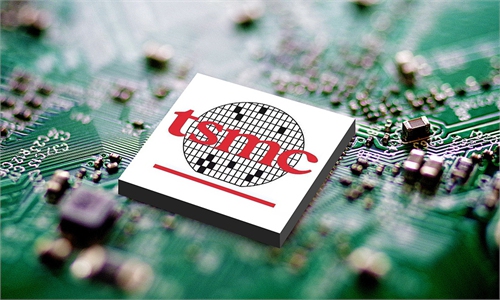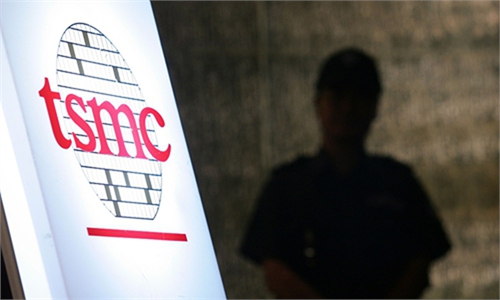
Illustration: Tang Tengfei/Global Times
South Korean chipmakers recorded their first fall in factory shipments in almost three years in July, with shipments tumbling 22.7 percent year-on-year, Bloomberg reported. As nationwide inventories remained elevated in July, South Korea's chip production slowed for the fourth straight month, a sign that major producers such as Samsung Electronics and SK Hynix are preparing for a downturn as demand begins to fade.The sharp fall of South Korean chipmakers' shipments come as the global semiconductor sector is going through a very thorny and complicated situation. The chip shortage over the last few years has suddenly morphed into a supply glut amid a global downturn, which some analysts said could be "the worst in at least a decade, and possibly two."
In addition to the weak global demand caused by the impact of the COVID-19 pandemic, the chip industry faces another major challenge: a series of moves linked to "chip hegemony" and "technological terrorism" by the US that has seriously disrupted and fragmented the global supply chain established over the past decades.
Suppressing Chinese chip technology companies, coercing chip giants across the world to invest and set up factories in the US, and trying to form a small circle of "Chip 4" alliance out of geopolitical calculations... an endless series of blockade and decoupling practices undertaken by the US are seriously disrupting the global chip industry chain and piling pressure on countries like South Korea whose economies rely heavily on chip exports.
It is foreseeable that the US will not change this strategy for a long period of time as a consensus has been formed in the American political circles that chips are a key strategic material to win their politically charged tech competition against China. Therefore, South Korea is expected to remain under constant pressure from the US.
Recently, the US has spared no effort to force South Korea, Japan and China's Taiwan region into a so-called "Chip 4" alliance, in an attempt to split regional industrial supply chain. Such political interference aimed at forcing companies to choose sides between China and the US has caused serious trouble for major South Korean chip companies.
In the face of the complex situation of the global semiconductor industry and the uncertain global economic outlook, semiconductors, as an important sector of its national economy, South Korea must independently formulate its own semiconductor industrial strategies based on their actual economic interests, rather than being controlled by the US. If anything, the sharp fall in shipments in July sounded the alarm for South Korea.
If South Korea's industrial policy is to truly serve its own economic interests and the development of the chip industry, it must be clear that South Korea cannot afford to abandon the Chinese market. A report from the Semiconductor Industry Association this year has revealed that China remains the largest individual semiconductor market in the world.
In fact, the US blockade has boosted production and sales of China's domestic chipmakers, as reflected in the decline of chip imports this year. The South Korean semiconductor companies' share in the Chinese market has fallen since 2019, when the US began to restrict semiconductor supply to China, according to an industrial report earlier this year. Whether South Korean chipmakers will expand or lose market share in China now depends on South Korea's industrial policy for its semiconductor sector.
Under the reckless suppression and blockade by the US, China's strategy for its chip sector is to take necessary measures to protect legitimate rights and interests of firms, as well as unwaveringly expand opening up, especially to deepen cooperation with regional economies such as South Korea. The regional supply chain is mature, and regional economic and trade has moved toward a high degree of integration, which is of great significance to regional economic growth amid uncertainties.
US coercion cannot interfere with the laws of economic cooperation. Its tech terrorism and hegemony designed to contain China are wishful thinking and are doomed to fail. As China is expected to play an increasingly important role in global semiconductors in the future, it is hoped South Korea can focus on the trend of the industry development and make right industrial policy.
The author is a reporter with the Global Times. bizopinion@globaltimes.com.cn



